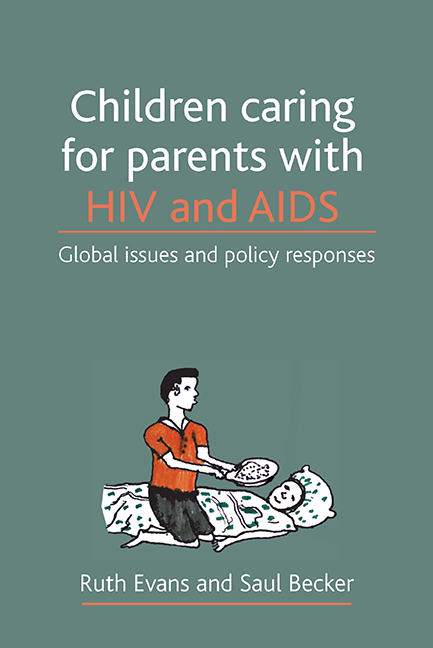Book contents
- Frontmatter
- Dedication
- Contents
- List of tables, figures and boxes
- Preface
- one Children’s and young people’s caring responsibilities within the family
- two HIV and the family
- three Reflexivity, methodology and ethics: the research process
- four Living with HIV and the effects on family life: parents’ narratives
- five Children’s and young people’s care work in households affected by HIV and AIDS
- six Resilience and impacts of care work for individual young people and their families
- seven Resilience and impacts of young people’s care work within the school and wider community
- eight The role of formal safety nets in building children’s and families’ resilience
- nine Global and local processes influencing young people’s caring roles in families affected by HIV and AIDS
- ten Responding to the support needs of children and young people caring for parents with HIV
- Bibliography
- Index
six - Resilience and impacts of care work for individual young people and their families
Published online by Cambridge University Press: 21 January 2022
- Frontmatter
- Dedication
- Contents
- List of tables, figures and boxes
- Preface
- one Children’s and young people’s caring responsibilities within the family
- two HIV and the family
- three Reflexivity, methodology and ethics: the research process
- four Living with HIV and the effects on family life: parents’ narratives
- five Children’s and young people’s care work in households affected by HIV and AIDS
- six Resilience and impacts of care work for individual young people and their families
- seven Resilience and impacts of young people’s care work within the school and wider community
- eight The role of formal safety nets in building children’s and families’ resilience
- nine Global and local processes influencing young people’s caring roles in families affected by HIV and AIDS
- ten Responding to the support needs of children and young people caring for parents with HIV
- Bibliography
- Index
Summary
The growing body of research on young carers in the North has suggested that many children experience a range of negative outcomes for their education, health, emotional well-being, social lives and transition to adulthood as a result of their care work, as we discussed in Chapter 1 (Aldridge and Becker, 1993; Dearden and Becker, 1995; Becker et al,1998; Dearden and Becker, 1998; Frank et al, 1999; Thomas et al, 2003; Dearden and Becker, 2004). Research in the UK and Sub-Saharan Africa has also identified a range of positive outcomes for children who care for a family member, such as increased knowledge and understanding, a sense of responsibility, maturity and life skills, as well as closer relationships between children and parents (Gates and Lackey, 1998; Blackford, 1999; Dearden and Becker, 2000; Aldridge and Becker, 2003; Robson et al, 2006). Thus, there has been growing recognition that not all young carers experience negative outcomes (Dearden and Becker, 2004) and some researchers suggest that a resilience perspective may help to explain individual differences in coping with adversity (Rutter, 1990; Howard et al, 1999; Newman, 2002a; 2002b; Evans, 2005). In this chapter, we draw on the concept of resilience in examining the effects of children's care work for individual children and young people, focusing on their emotional well-being, health and welfare, personal development, aspirations and priorities for the future, as well as the effects on family relationships.
Resilience and impacts for children and young people at the individual level
Within the resilience literature, several protective factors have been identified that relate to attributes of individual children themselves, such as problem-solving skills, high aspirations, good social skills with peers and adults, feelings of empathy for others and self-efficacy (belief that one's efforts can make a difference) (Newman, 2002b; Schoon and Bynner, 2003). The following sections explore the impacts of caring responsibilities for individual children and young people.
Emotional well-being
Previous research suggests that children's caregiving can have a negative impact on their emotional well-being and psychosocial development (Elliott, 1992; Dearden and Becker, 1995; 1998; 2004). As discussed in Chapter 2, the literature on the impacts of HIV/AIDS also suggests that children's psychosocial well-being can be severely affected by parental HIV/AIDS, particularly when they have to deal with multiple losses of one or both parents and sometimes siblings and other relatives (Bauman with Germann, 2005).
- Type
- Chapter
- Information
- Children Caring for Parents with HIV and AIDSGlobal Issues and Policy Responses, pp. 151 - 174Publisher: Bristol University PressPrint publication year: 2009



